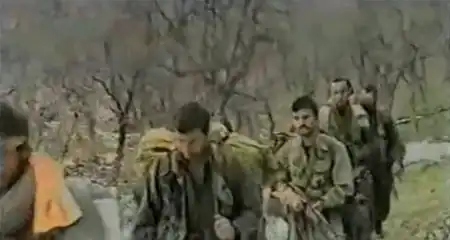Operation Hammer (1997)
Operation Hammer (Turkish: Çekiç Harekâtı) was the largest cross-border operation done in the history of Turkish Armed Forces into northern Iraq between 12 May and 7 July 1997 against the Kurdistan Workers' Party (PKK).
| Operation Hammer | |||||||
|---|---|---|---|---|---|---|---|
| Part of the Kurdish–Turkish conflict and Iraqi Kurdish Civil War | |||||||
 Turkish Special Forces personnel from the 29th Special Forces Battalion 4 weeks into the operation. | |||||||
| |||||||
| Belligerents | |||||||
|
|
| ||||||
| Commanders and leaders | |||||||
|
|
| ||||||
| Strength | |||||||
|
30,000[5]–50,000 soldiers[2] 10,000 village guards[5] | 5,000–6,000 PKK fighters[6] | ||||||
| Casualties and losses | |||||||
| Total: 314 killed |
PKK: 2,730 killed, 415 captured[7] | ||||||
The operation's objectives were to destroy PKK units in northern Iraq, to strengthen Massoud Barzani's Kurdistan Democratic Party in its ongoing Civil War with Jalal Talabani's Patriotic Union of Kurdistan in the hope that the KDP would prevent further PKK raids into Turkey, and to counter Iranian influence in the region as Turkey accused Iran of supporting the PKK, and over 2,000 Iranian forces had entered Iraqi Kurdistan that year to aid the PUK.[9]
Conflict
Some 30[10]–50,000[2] Turkish forces entered Iraq on 14 May in response to an appeal by the Kurdistan Democratic Party for support in its offensive against the PKK.[2] On 19 May, the KDP launched a military operation to evacuate all PKK fighters from their capital in Arbil,[10] which turned into a major battle in which 53 KDP and 58 PKK fighters were killed. In response the PKK ordered four suicide bombings from 1 to 11 June which resulted in the death of 55 KDP fighters.[8] By 7 July, when Turkish forces withdrew, over 2,000 PKK and at least 200 KDP forces had been killed.[8]
The operation drew strong condemnation from Iraq, Iran and Syria.[2]
Turkey launched another large-scale operation in September known as Operation Dawn.[11]
International reaction
- Iran: The Iranian government condemned the invasion "as not only a violation of all international laws but the sovereign rights and territorial integrity of the Iraqi Muslim nation" and denounced Turkish claims of Iranian support for the PKK as "a joint conspiracy by the Turkish military and Israel."[9]
See also
- Operation Steel (1995)
References
- "Irak'ın kuzeyine gerçekleştirilen büyük harekatlar". 28 May 2019.
- The Europa World Year: Kazakhstan – Zimbabwe. 2004. ISBN 9781857432558. Retrieved 11 February 2015.
- Aylin Ünver Noi, 1 July 2012, THE ARAB SPRING, ITS EFFECTS ON THE KURDS, AND THE APPROACHES OF TURKEY, IRAN, SYRIA, AND IRAQ ON THE KURDISH ISSUE Archived 17 September 2012 at the Wayback Machine, The Global Research in International Affairs Center
- http://www.radikal.com.tr/haber.php?haberno=194212
- "(page 155)" (PDF). Helsinki.fi. Archived from the original (PDF) on 12 October 2017. Retrieved 7 July 2017.
- Tokat, Altay (2013). Mücadele ve Çözüm (PKK Bölücü Terörü).
- "Çekiç harekatı (12 Mayıs – 7 July 1997)". Hürriyet Daily News. Archived from the original on 12 October 2007. Retrieved 11 October 2007.
- Chronology for Kurds in Iraq Archived 17 October 2012 at the Wayback Machine, UNHCR
- Gunter, Michael M. (1 March 1998). "Turkey and Iran Face off in Kurdistan". Middle East Quarterly. Retrieved 7 July 2017.
- United Nations High Commissioner for Refugees. "Refworld – Chronology for Kurds in Turkey". Refworld. Archived from the original on 17 October 2012. Retrieved 11 February 2015.
- "PDF2" (PDF). AsylumLaw.org. Archived from the original (PDF) on 16 July 2011. Retrieved 7 July 2017.
External links
- Archived 9 April 2015 at the Wayback Machine